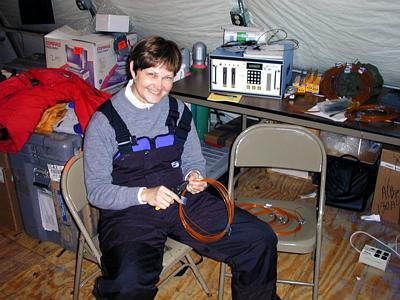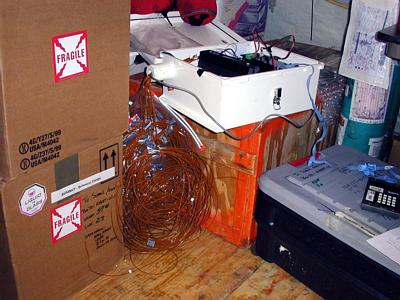3 June, 2000
dawson journal 06/03/00
Greenland is letting us know it is not ready for summer. Winds did
not ease during the night and increased to 30 knots today. The
temperature has hovered around -20 C. There were times that the
driven snow blanked out most of the huts around the main house. The
snow drifts are awesome, with streams of snow flowing over them
smoothing footprints. Areas that the tractor plow had made roadways
are now filled with beautifully sculptured walls of snow. (Not so
beautiful to Tim, the heavy equipment operator, I bet).
At last I am working on a part of a project that involves more than
just peripheral helping. Dr. Mary Albert of Cold Regions Research and
Engineering Laboratory (CRREL) is here studying the physical
attributes of snow and firn, such as permeability (how the holes or
airspaces in the snow are connected) and diffusion (the process of
temperature, gas, or chemical movement as it slowly passes through
the snow). One of the aspects of this research involves the
temperature at different depths. To do this, we made 19
thermocouples from double- stranded wire this afternoon. Then Dr.
Albert showed me how she wanted the thermocouples connected to the
data recorder, and I proceeded to get that done. Tomorrow I will
calibrate them. More on this later.
Tonight there was a meeting of all the scientists and their
associates to discuss where they were on their projects and the
objectives that everyone wanted to pursue this field season. It was
interesting to hear them discuss the same things that are discussed
in the classroom: Is this controlled? How will it affect...? How
should we...? Very enlightening and reasuuring that what we do with
research and experimentation in the class is essentially the same as
it is in the field. And curiosity is ageless.
Warm regards,
Besse Dawson

Master electrician at work!! > <>

After I had made all 19 thermocouples, I had to wire them into the box so they could be read by the data sensor. Looks like a spaghetti bowl of wires, but they were actually quite organized. > <>

Contact the TEA in the field at
.
If you cannot connect through your browser, copy the
TEA's e-mail address in the "To:" line of
your favorite e-mail package.
|
